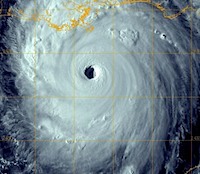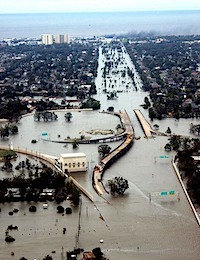When doing my behavioural ecology at the University of Dundee, I was always fascinated by the 'Tragedy of the Commons', an event that Garett Hardin made famous in 1968 with a paper of the same name.
I'd never read Garett Hardin directly though, and there's always a suspicion that if you don't read the original source, you may have in fact got completely the wrong end of the stick if you keep reciting something 3rd hand. So I recently acquired 'Filters Against Folly' by Hardin.
What is slightly disconcerting is that the book was written in 1983. Here are two excerpts that looks suspiciously like premonition but in fact are a direct consequence of what Hardin calls 'ecolate' thinking (this can be described as once someone makes a position statement, the ecolate thinker says ' ... and then what?'). On page 76, I came across this:
"China has learned her lesson [that to deforest an area can cause flash floods], but have we learned ours? Under the direction of the Army Corps of Engineers, we continue to try and control the floods by brute force of levees and dams in the lowlands rather than be reforsting the distant highlands where floods are generated. Levees, like cocaine, are addictive: building them increases the craving for more. Raise the levees and you raise the bed of the river as more silt is deposited. This in turn requires the levees to be raised still further, thus increasing the damage done whenever, after many such cycles, the river finally breaks free of man-made controls. St. Louis and New Orleans are living on borrowed time, and all because the simple-minded policy of controlling floods by building levees and dams has not been challenged with the ecolate question, "And then what?""
And then a moderate hurricane called Katrina came along and the rest (as one is prone to say) is history. The fact that Hardin wrote specically about New Orleans does tend to make a shiver go up one's spine however. Later on though on page 121 he writes:
"When a company as large as Chrysler is in danger of going "belly-up," new strategies of survival become possible. When it became obvious that this large automobile company was in imminent danger of bankruptsy some of the more principled supporters of the free market insisted that nature be allowed to take its course, to empathasize that what we carelessly called the "profit system" is reall a profit-and-loss system. Forgiving the loser today, itw as felt, would run the risk of escalating bankruptcies in teh future. The suspicion was a reasonable one, but nonetheless Chrysler managed to wangle a bail-out from the government. To date, the salvage has not led to a rash of imitators."
Reference: Hardin, G. J. (1986). Filters against Folly: How to Survive despite Economists, Ecologists, and the Merely Eloquent. Penguin Books Australia. Retrieved from http://www.amazon.co.uk/Filters-against-Folly-Economists-Ecologists/dp/0140077294.

